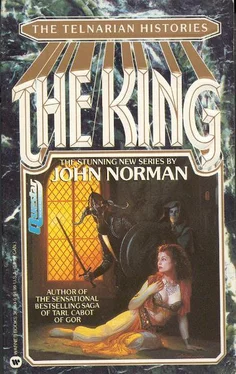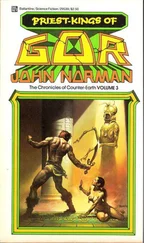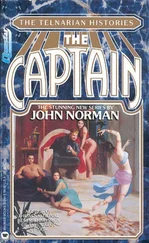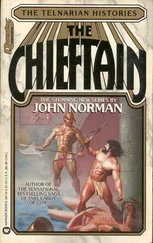“Proceed,” said Rolof.
“Proceed,” said Valdemar.
“There is yet time to withdraw,” said Urta.
“Proceed!” said Gundar.
“Each of you claims the hero’s portion?” said Urta. He looked from one to the other, in turn.
“Yes,” said Rolof.
“Yes,” said Valdemar.
“Yes,” said Gundar.
“Yes,” said Hartnar.
“Yes,” said Gelerich.
“Yes,” said Astarax.
“Behold,” cried Ulrich, suddenly, elatedly, rising, pointing, “you are too late! It is already claimed!”
There were cries of rage, and of astonishment, throughout the hall.
On the table itself, towering there, legs spread, stood the blond giant. The great blade, five feet in length, was thrust into the body of the boar. He had held with two hands the hilt of the great blade, above his head, the point downward, and then plunged it downward. The point of the blade could be seen beneath the table where it had emerged, splintering the plank.
“Kill him!” cried men.
“Sacrilege!” cried others.
“Blasphemy!” cried others.
“How dare you do what you have done?’’ cried Urta, aghast.
“I am hungry,” said the giant.
“Kill him!” screamed men.
The giant loosened the blade, and, lifting it, with three blows, hacked away the right, rear thigh of the massive boar.
He then, with the blade, sliced away a slab of hot meat, running with blood and juice.
He bit into this, deliberately, looking about himself, the blood and juice running at the side of his mouth.
“Kill him!” cried men.
“Surely others are hungry as well,” he said.
He cut another piece of meat, and held it out to Urta, who drew back.
The giant then turned about.
“Untie the slave,” he called.
One of the men at Ulrich’s table crouched down behind the table and freed Yata’s wrists and ankles. He wrapped the leather several times about her left ankle, and knotted it there, rather in the nature of a slave anklet. The slave may not undo such a knot without permission. It can be death to do so. Too, in this fashion, carrying the leather with her, she may be conveniently, instantly, bound, leashed or tethered, that at one’s discretion.
The giant motioned that she should approach, and she did so, hesitantly, self-consciously, the eyes of all upon her.
She knelt below the table on which he stood, waiting, and he threw her the piece of meat which Urta had refused, and pointed back, toward Ulrich.
She rose and carried the meat to Ulrich, placed it before him, on the bare table, and then knelt near the table, facing the giant, her master.
“What is wrong?” asked the giant, calling to the tables. “Have you never seen a naked slave serve at a feast before?”
Ulrich did not touch the meat, but, eyes glistening, kept his eyes on the giant.
“Women of the empire,” said the giant, “serve such feasts well.”
He recalled perhaps a small feast at which, on Vellmer, three women of the empire had so served, and well, Flora, Renata and Sesella. Another had served, too, and well, Gerune, but she had not been of the empire. She had been once a Drisriak, and then an Ortung, and then but livestock, a slave.
“On behalf of whom do you claim this meat?” asked Urta.
“On my own behalf,” said the giant.
“By what right?”
“By the right of my hunger,” said the giant.
“That is not enough,” said Urta.
“By the right of my pleasure then,” said the giant.
“That is not enough,” said Urta.
“By the right of my will then,” said the giant.
“That is not enough,” said Urta.
“Then by the right of my sword,” said the giant.
“Whose champion are you?” asked Urta.
“I am my own champion,” said the giant.
“You cannot claim this meat,” protested Urta.
“Dispute it with me who will,” said the giant, cutting another piece of meat.
He then, piece by piece, cut meat, throwing the meat to the slave, who carried it to one warrior or another, as indicated by the giant. He read the warriors, and in reading them, seeing who seemed young, and virile, and dangerous, and perhaps fit to be a companion, accordingly made his selections. None touched the meat put before them, but the eyes of many shone, and the hands of more than one inched toward the steaming, juicy provender.
“He gives meat!” cried a retainer of Rolof.
“He is a giver of meat,” said a man, in awe.
“You are not a lord, to provide for companions, for a retinue!” said Urta.
“I have seen one who looked much like him, once before, long ago!” said a man.
“Where is Fuldan, the Old?” asked another.
“He has been sent for,” said another.
“He is a stranger,” said Hartnar, angrily.
“He has brought to the hall the pelt of a white vi-cat,” said Ulrich. “It is the first time in a generation such a pelt has been in this place, not since Genserix.”
“It means nothing!” cried a man.
“Such was the mantle of Genserix,” said Ulrich.
The man was silent.
“Who are you, stranger?” demanded a man.
“A peasant, a fighter, one who was lifted upon the shields of Wolfungs, a Vandal people, as are the Otungs, a captain in the auxilia of Telnaria, come simply to recruit a company,” said the giant.
“What is your people?” asked a man.
“I do not know,” said the giant.
“I think you are Otung,” said a man, in awe.
“Then,” said the giant, “I am come home, and would be welcomed.”
“Think, think!” cried Ulrich. “The Heruls put upon us year kings, insult kings, kings to divide us, kings to be replaced, kings who are to us as prisons and fetters, kings we despise and ignore, kings who are nothing, a kind of kings created by our enemies, kings who have but a compromised, meretricious, bestowed prestige, and one bought dearly with our own blood. The Heruls defeated us once, in battle, now they defeat us each year, by guile. Why do you think the Elbi propose no king, no champion? We will not play the game of the Heruls. I say, make no king, or make a true king!”
“The Heruls will not permit a true king,” said Urta.
“Then make no king!” said Ulrich.
“The Heruls will be displeased,” said Urta.
“Let them be displeased,” said Ulrich.
“Yes,” said men, softly.
“We cannot meet them, unmounted, on the plains,” said Urta.
“And I do not think they will much care to seek us out in the darkness of the forest, in the shadows, in the growth and underbrush,” said Ulrich. “Long ago, Telnaria lost armies in such endeavors.”
“No more false kings,” said a man.
“No king unless it be a true king!” said a man.
There were cries of approval from about the tables.
“It will mean war,” said Urta.
“Lift me upon the shields,” said Rolof. “I will be true king.”
“No!” cried Valdemar.
“No!” cried other claimants.
“There would then be but one slaughter,” said Rolof.
“We will not risk a king of clan Gri,” said Astarax.
“Then year kings again it must be,” said Valdemar.
“It is madness!” cried Ulrich. “Why must the clans and houses, the families, the lineages, war with one another? Are we not all Otung?”
“I yield to no one,” said Gelerich.
“Nor I!” said Astarax.
“I would not hide all my days in the forest,” said Ulrich. “I would one day come forth from the forest, bravely, with oxen and wagons, with songs, and arms, marching. We have hidden here long enough, imprisoned not by Heruls but by our own vanities and rivalries.’’
“We are not yet strong enough,” said Urta.
“Let us take the first step, the first step on our march,” said Ulrich. “If we must have a king, and cannot have a true king, then let us make a year king, but one who has no party, one who is not of the table of a given house, one who has taken rings from no man, one by means of whom to satisfy, and yet reprove and mystify, Heruls.”
Читать дальше












